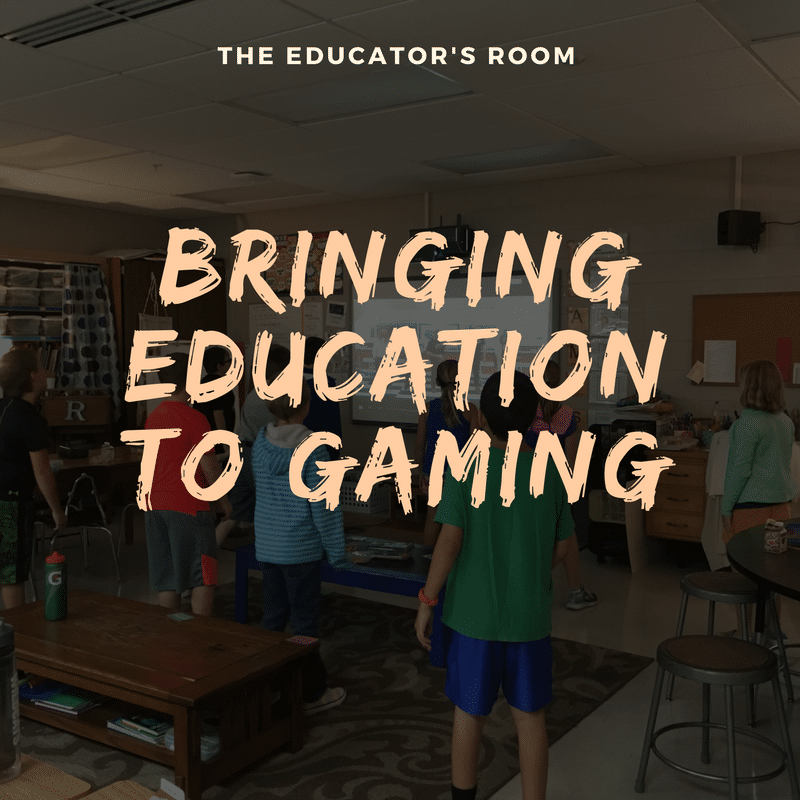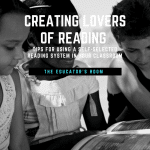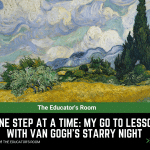The spear whistled through the air, but the aim was low. The huge tail swished and contemptuously flipped it aside. Then the black form dropped into the foaming waters.
“Missed,” Cico groaned. He retrieved his line slowly…
“Are you sorry you missed?” I asked as we slid our feet into the cool water.
“No,” Cico said, “it’s just a game.” (Bless Me Ultima, Rudolpho Anaya)
Teachers I admire most ask the important question, what is gaming and why should we do this? Gaming is defined as an activity or pastime, providing entertainment or competition. Most childhood games, board games even the “let’s pretend” role playing games of dress up had clear, defined rules supplied either on paper or are agreed upon orally. Today’s digital games promote a different skill set. They draw you in with vivid screen imagery and sounds to rules embedded in the game. There is a positive emphasis on losing as it leads to new skills and actions, sometimes evolving with the player who has control of that evolution. Gaming relies on repetitive play and persistence so this is why we do this. The teacher’s role is not of expertise and experience but that of spectator and coach, encouraging connections to contextual knowledge. Within an effective classroom, students have routines for learning and practicing content. Gaming is that consistent opportunity for application to the “why are we learning this?” question in a virtual space. Teachers concede control of what students experience but gain the responsibility for directing analysis of experiences in discussions that follow. We present their game just as a coach presents a team with playbacks.
The first step in committing to gaming is to designate a set, weekly time. Start with games you know, the fun factor being important. Children born after 2003 live in a world with global networks, mobile technology and may have missed out on board games such as Mad Libs, or even Tug of War. As long as the time to game is routine, teachers can intermix game experiences while developing confidence with online applications. Effective teachers have gaming mentors who share the responsibility of finding games. I used to rely on fellow teachers and program leaders like those I met through Foundations for Teaching Economics . Now I rely on students. Every year I request a student or a group (Geek Squad) who earn community service credits as lab assistants. This team shares the responsibility for disseminating knowledge related to online games that I won’t necessarily find on my own. They test and present games that I have the authority to reject but I seldom do. Geek Squad responsibility for game day is a privilege that they love. They explain the content and inter-textual connections to their peers, better than I can. A UN refugee simulation employed during a globalization unit wouldn’t have been done without my Geek Squad.
Successful teachers provide students with choices. Allow students to utilize social gaming networks, work as individuals or passively learn next to an eager peer. I review game rules I find on Wikipedia while my seven-year-old daughter moves her hands across the screen in search of interactive spaces. Together we team up, deciding actions or posting questions through game links to Twitter or Facebook, enjoying the camaraderie. Evidently, “children who make the most of these technologies do so in the context of families and communities of practice (& sometimes schools) that support their efforts or at the very least have modeled some of these same dispositions”. (link)
The freedom to fail is a teaching tool difficult to wield in classrooms but is essential to good gaming. Nona Allen’s article, Shall We Debate? An Approach to Writing! reminded me of the stress teachers have balancing content with standardized tests and the Common Core. Her debate club is a game environment where students tackle issues, scouring for evidence both negative and affirmative of a position. They succeed because it is safe to fail, it’s only a game. Online games expect failure and instant replay to advance to the next level. Another outcome of gaming not found in a typical classroom is the indirect creation of the Affinity Space. Gaming theorist, James Paul Gee’s explains this as virtual places where players engage in subsequent challenges, working out formulas, and puzzles. My students made a class donation to Kiva.org. and began following news and country report status to correlate impacts on entrepreneurs. Speculating on possible NGO actions became the incentive. Speculation is also an incentive in Alternate Reality Games. ARG blends imagination, reality and open ended questions. Students love ARG because they can set aside their own identities and stereotypes as they follow an inquiry. I recently discovered a lesson in which students explored life’s worst case scenarios utilizing The Sims. Students chose to study outcomes of poverty or natural disaster, comparing and contrasting it to real world experiences. No textbook can match this.
Do not limit gaming to interactive quizzes. Anything too complicated, too deliberately educational or limited by the classroom will disappoint everyone involved. Grading can ruin learning so I suggest grading only asynchronous posts. Posted content should meet high expectations but students need the freedom to critique within an expansion of time (three days) either publicly or privately under a pseudonym. Fruitful repose and reflection are the results of open-ended questions. “What if…” never gets old. (link)
My favorite one was a game where you were a boy in a snowy field and you had to throw snowballs at other kids trying to hit you. I loved this game as a little kid and I wish that they would remake it for windows 7 so that other little kids can have their dads show them how to play. — joe p^2
Gaming is necessary for both traditional and unconventional teachers. I realized that just as a lack of exposure to literacy can precede a gap in reading, so too can a lack of experience create a technology gap. Never has it been more urgent for teachers to promote deliberate gaming in education.








Nice post. I learn something new and challenging
on blogs I stumbleupon on a daily basis. It will always be
exciting to read through content from other writers and use a little something from other web sites.